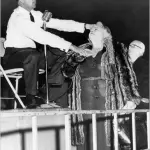In recent years, a serious discussion has taken place around the subject of race. Various events in American public life have prompted and informed dimensions of this discussion, including some events that have shocked and saddened many. Thankfully, within Christian circles, many believers seem to have a common desire to work for unity along ethnic lines. But there is considerable discussion, and even disagreement, about how best to do so.
The worldview called critical race theory (CRT) has gained some traction in this discussion. It is argued by some that CRT is a system of thought that Christians can support in some measure, using it as a prism by which to see the world and (therefore) gain vital insights about it. There is a good deal of debate about CRT among believers, and not a little disagreement about what it means to engage it. Some seem to mean that we can interface with CRT the same way we can any philosophical system, analyzing it in service of a thoroughgoing critique, while others seem to mean something more. They advocate for viewing CRT as a philosophy that helps explain our current situation in societal and even ecclesial terms.
In the middle of these views, I suspect, are many unsettled people, not a little confused by the terms, the issues, and the broader significance of the respective positions. They want unity in Christ, they have a genuine desire for the demonstration of that unity, but they are unsure about different elements of the conversation in question. Friends who agree about much end up disagreeing over CRT, suffice it to say, with not a little cloudiness in the conversation. This four-part interaction is an attempt to bring some clarity to these matters. This series is not an exhaustive account of CRT, nor does it attempt to be; it is a primer, essentially, a blog-level interaction with CRT as a system. (For a deeper Christian interaction, see this, for one evangelical engagement of “wokeness,” see this, and for a sympathetic secular overview, see this and this.)
Before we analyze CRT as a system and offer a seven-point critique, let’s think about our first principles.
First Principles: We Are Unyieldingly Anti-Racism and Pro-Christ
CRT engages, at base, the problems of racism and ethnocentrism in the West. We should all engage such matters, and should think carefully and biblically about them. At the outset of this discussion, we should be abundantly clear: racism and ethnocentrism are real and historical sins. They have not caused a little bit of division; across the entire world, in all eras of history, these iniquities have caused great pain and suffering.
This recognition hits uncomfortably close to home for the church. Even believers, including some whose teaching in numerous areas we rightly esteem, have gotten matters wrong here. There are historical figures we rightly admire in different areas that supported slavery, segregation, and policies that deny the fullness of the reality of the imago dei in people of color. We make no effort to whitewash or ignore these historical failings, nor to downplay the necessity of fighting ethnocentrism and racism wherever such sins rear their head. We note this even as we give thanks for major societal and cultural progress in the West over the last two centuries, and as we reject the view that we should offhandedly “cancel” engagement of gospel-loving theologians who show evidence of sinful thinking and acting. (This same evidence, after all, will be found in our work long after we shed this mortal coil.)
We have much to say as the church about these issues. The person and work of Jesus Christ is the Bible’s answer to division of every kind. We should be careful not to read the Pauline distinction between Jew and Gentile in ethnic terms, primarily, but we do also note that these groups were alienated from one another. In his atoning death, Jesus made “one new man” of the two groups (Eph. 2:15). If the cross of Christ has overcome the propulsive hostility between Jew and Gentile, it has overcome all other such dividing walls, shattering them, bringing them down by cruciform power made effectual following the resurrection (see the powerful testimonies of several Christian pastors in this very helpful book).
Justifying faith grounded in Christ’s cross leaves us with no ultimate separation between once-balkanized people. In Christ, there is neither Jew nor Gentile, man nor woman, slave nor free (Gal. 3:28). Paul does not mean we collapse into anthropological ooze in our moment of justification; he does mean we are now united by the most powerful force there is in the cosmos, the love of God activated by the grace of God.
The Beauty of the Local Church
This beautiful vision takes real shape in one key institution: the local church, which is called as much as it can to represent the diversity of the universal church. God does not want us to be united spiritually without any clear demonstration of this unity. God wants us to come together in local churches united around biblical doctrine and anchored salvifically in the gospel of grace. Once we join the local church, we seek to do all we can to make good on the unity Christ has already secured. We build friendships with people we have nothing in common with outside of our common Savior, a crucified Middle-Eastern Jew by background who began a truly global movement of the gospel.
This point matters greatly, and is often under-discussed. Millennia before America became an evangelical hub, the gospel spread like wildfire in the Middle East, Asia, Africa, and beyond. Those who see Christian influence and theology as “Western” need to do their historical homework; that is far from the truth. We have been a global movement from day one (for more on this, see my chapter on “Race & Ethnicity” in this book). For this reason, we are not forced into a false choice between loving diversity and disavowing secular theories; instead, we should celebrate diversity and work in common-sense, non-alarmist ways to honor our unity in Christ in institutional terms while, in obedience to Colossians 2:8, steadfastly refusing to allow any worldly philosophy to take us captive (more on this to come).
Real divisions remain in our world, and many of us long for the day when our global body is one. Until that day, we cannot ourselves refigure our communities into ideally diverse settings, but we can demonstrate to the world through our vibrant fellowship that nothing unites like the blood of Christ. We have much more to say here, and this hard work to be sure, but the local church is intended by God to thwart the wisdom of the world. It should show—as much as it can per its surroundings, an important nuance—that worldly unity is not true unity. Strong as it may feel, it is ultimately no more than temporary affinity. The love of God is what truly connects, truly links, truly overcomes real sin and real division. As much as Christ loves his blood-bought people, so Satan hates the body, hates its unity in Christ’s cross, and works tirelessly to undermine it. We must remember that the “one new man” is ever in danger of attack, for Satan hates nothing more on this earth than our unity in—and union with—the Son of God.
The preceding is not pro forma material; it is nothing less than God’s plan for overcoming natural divisions, animosity, and hatred in fleshly, ecclesial form. But we can say more than this: the local church, the foretaste of the gathered church in all eternity, is positively how God displays that his gospel is a gospel of love, the strongest force in the cosmos, stronger than Satan, stronger than generational hatred, stronger than sin, stronger than hell.










